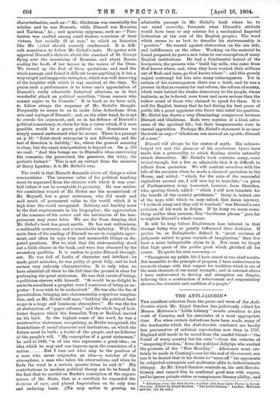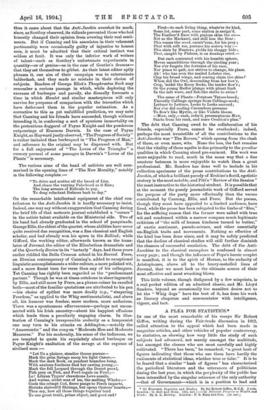thus it came about that the Anti - Jacobin overshot its mark,
since, as Southey observed, its ridicule prevented those who had honestly changed their opinion from avowing their real senti- ments. But if Canning and his associates in their vehement partisanship were occasionally guilty of injustice to honest men, it must be admitted that their critical instinct was seldom at fault. It was only the inferior work of writers of talent—such as Southey's unfortunate experiments in quantity—or of genius—as in the case of Goethe's dramas— that they set themselves to gibbet. As their latest editor aptly phrases it, one aim of their campaign was to exterminate balderdash, and they made no mistake in their choice of subjects. Headers of George Eliot's Theophrsatus Suds may remember a curious passage in which, while deploring the excesses of burlesque and parody, she dismally forecasts a time in which Hamlet and similar masterpieces will only survive for purposes of comparison with the travesties which have dethroned them in the popular estimation. As a corrective to this as yet unfulfilled prediction, we may note that Canning and his friends have succeeded, though without intending it, in conferring a sort of spurious immortality on the pretentious doggerel of Payne Knight and the ponderous outpourings of Erasmus Darwin. In the case of Payne Knight, as Hayward justly observed, "The Progress of Society" is rather imitated than burlesqued in "The Progress of Man," and reference to the original may be dispensed with. But for a full enjoyment of "The Loves of the Triangles" a cursory perusal of some passages in Darwin's " Loves of the Plants" is necessary.
The various aims of the band of satirists are well sum- marised in the opening lines of "The New Morality," notably in the following couplets
"To drive and scatter all the brood of Lies. And chaos the varying Falsehood as it flies ; The long arrears of Ridicule to pay, To drag reluctant Dulness back to day."
On the remarkable intellectual equipment of the chief con- tributors to the Anti-Jacobin it is hardly necessary to insist. Indeed, one may any without exaggeration that Canning during the brief life of that meteoric journal established a " corner " in the satiric talent available on the Ministerial side. Two of his band had already graduated in the school of pasquinade. George Ellis, the eldest of the quartet, whose abilities have never quite received due recognition, was a fine classical and English scholar, and had already won his spurs in the Ballad; while Gifford, the working editor, afterwards known as the trans- lator of Juvenal, the editor of the Elizabethan dramatists and of the Quarterly Review in its " tartarly " days, had three years earlier riddled the Della Cruscan school in his Baviad. Frere, an Etonian contemporary of Canning's, added to exceptional linguistic accomplishments a wider culture, a more polished wit, and a more fluent turn for verse than any of his colleagues. Yet Canning has rightly been regarded as the "predominant partner." Though he was at times outshone in sheer ingenuity by Ellis, and still more by Frere, as a phrase-coiner he excelled both—most of the familiar quotations are attributed to his pen —his choice of epithet was more deadly (e.g., "simpering Freedom," as applied to the Whig sentimentalists), and above all, his humour was fresher, more modern, more audacious. There was a spontaneous effervescence—perhaps not uncon- nected with his Irish ancestry—about his happiest effusions which lends them a peculiarly engaging charm, in illus- tration of Canning's irresponsible audacity as a lampoonist one may turn to his attacks on Addington,—notably the "Anacreontic" and the song on "Moderate Men and Moderate Measures." For his modernity, his sense of the ludicrous, we are tempted to quote his exquisitely absurd burlesque on Payne Knight's exaltation of the savage at the expense of civilised man :— " Let Lis a plainer, steadier theme pursue— Mark the grim Savage scoop his light Canoe;—
Mark the dark Rook, on pendant branches hung,
With anxious fondness feed her cawing young ;— Mark the fell Leopard through the Desert prowl,
Fish prey on Fish, and Fowl regale on Fowl ;— Lo ! Libyan Tygers' chawdrons Love assails,
And warms, midst seas of ice, the melting Whales ;— Cools the crimpt Cod, fierce pangs to Perch imparts, Shrinks shrivell'd Shrimps, but opens Oysters' hearts ;— Then say, how all these things together tend
To one great truth, prime object, and good end?
This slain by Hunters, yields his shaggy hide ; That, caught by Fishers, is on Sundays cried.— But each contented with his humble sphere, Moves unambitious through the circling year ;
Nor e'er forgets the fortunes of his race,
Nor pines to quit, nor strives to change, his place.
who has seen the mailed Lobster rise, Clap his broad wings, and soaring claim the skies ? When did the Owl, descending from her bow'r, Crop, 'midst the fleecy flocks, the tender flow's;
Or the young Heifer plunge with pliant limb
In the salt wave, and fish-like strive to swim ?
The same of Plants—Potatoes 'retool; breed ; lIncostly Cabbage springs from Cabbage-seed; Lettuce to Lettuce, ILeeks to Leeks succeed; Nor e'er did cooling Cucumbers presume To flow'r like Myrtle, or like Violets bloom.
—MAN, only,—rash, refin'd, presumptuous MAN. Starts from his rank, and mars Creation's plan."
The debt that Canning owed to the collaboration of his friends, especially Frere, cannot be overlooked ; indeed, perhaps the most irresistible of all the contributions to the Anti-Jacohin was "The Rovers," which sprang from the clash of three, or even more, wits. None the less, the fact remains that the vitality of these squibs is due primarily to the peculiar qualities in which Canning stood pre-eminent. His work was more enjoyable to read, much in the same way that a fine amateur batsman is more enjoyable to watch than a great professional. Mr. Sanders has done well to include in his collection specimens of the prose contributions to the Anti- .Tacobin, of which a brilliant parody of Erskine's florid, egotiatio oratory is the most notable, and Pitt's "Review of the Senion " the meet instructive to the historical student. It is possible that at the moment the purely journalistic work of Gifford served the purpose of the party more effectually than the verses contributed by Canning, Ellis, and Frere. But the poems, though they must have appealed to a limited audience, have lived, while the prose has been relegated to the limbo of "files," for the sufficing reason that the former were salted with true wit and condensed within a narrow compass much legitimate criticism of "the milk of human kindness turned to butter," of exotic sentiment, pseudo-science, and other essentially un-English traits and movements. Nothing so effective of the kind has been done since, and it may be safely predicted that the decline of classical studies will still further diminish the chances of successful emulation. The debt of the Anti. Jacobins to the classical exemplars is confessed in almost every page ; and though the influence of Pope's heroic couplet is manifest, it is to the spirit of Horace, to the audacity of Aiistophanes, above all to the heavy-metalled lines of Juvenal, that we must look as the ultimate source of their most effective and most swashing blows.
This little volume, though disfigured by a few misprints, is a real pocket edition of an admitted classic, and Mr. Lloyd Sanders, beyond an occasionally too manifest desire not to let the "Whig dogs" have the beet of it, has done his work as literary chaperon and commentator with intelligence, vigour, and tact.
A PLEA FOR STATISTICS.*
IN one of the most remarkable of his essays Sir Robert Giffen, writing during the Fair-trade discussion in 1882, called attention to the appeal which had been made in magazine articles, and other vehicles of popular controversy, to statistics, as showing how very little the study of such subjects had advanced, not merely amongst the multitude, but amongst the classes who are most carefully and highly cultivated. "There has been," he remarked, "a great hash of figures indicating that those who use them have hardly the rudiments of statistical ideas, whether true or false." It is to be feared that a similar "hash of figures" has characterised the periodical literature and the utterances of politicians. during the last year, in which the perplexity of the public has been intensified by the singular reticence of the only authority —that of Government—which is in a position to lead and • (1) Economic Ingitirica and Studio,. By Sir Hobert CHtIen, K.C.B. 2 vols. London G. Bell and Sons. [21a. net)-0) Nalional Progreas tn Wealth and Trade. By A. L. Borrley. London P. S. King and Son. [rd.. not. J







































 Previous page
Previous page